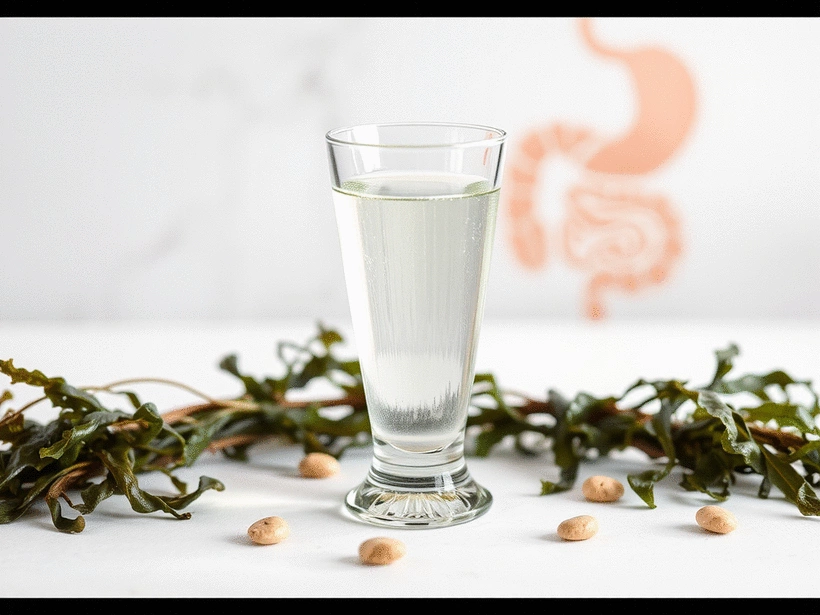Alginates and GERD: Treatment Insights

Are you aware that alginates, derived from seaweed, can offer a natural alternative for managing GERD symptoms? These compounds create a protective barrier that can significantly alleviate discomfort caused by acid reflux. Let’s dive into the essential insights you can gain about this innovative treatment option.
What You Will Learn
- Alginates form a gel-like barrier in the stomach that helps prevent acid reflux.
- This natural treatment option is derived from brown seaweed, offering a holistic approach to managing GERD.
- Compared to antacids and PPIs, alginates do not affect acid production, making them an appealing choice for many patients.
- Alginic acid, the active ingredient in alginates, contributes to healing the esophagus from reflux damage.
- Research suggests that alginates may provide longer-lasting relief than traditional treatments by physically preventing irritation.
- Combining alginates with lifestyle modifications can enhance their effectiveness in managing GERD symptoms.
Alginates vs. Traditional Treatments for GERD
Understanding the key differences in how alginates, antacids, and PPIs manage GERD can help in choosing the most suitable treatment approach.
Alginates: The Protective Barrier
Alginates are derived from brown seaweed and form a gel-like "raft" when they come into contact with gastric acid. This raft floats on top of the stomach contents.
- ✓ Forms a physical barrier
- ✓ Prevents acid reflux into esophagus
- ✓ Does not affect acid production
Traditional Treatments: Antacids & PPIs
Antacids and Proton Pump Inhibitors (PPIs) are common pharmaceutical approaches to managing GERD symptoms, each with a distinct mechanism of action.
- ✗ Antacids: Neutralize stomach acid
- ✗ PPIs: Reduce acid production
- ✗ Potential side effects with long-term use (PPIs)
Understanding Alginates and Natural Barrier Treatments for GERD
As a gastroenterologist, I often encounter patients looking for effective ways to manage their GERD symptoms. One promising treatment option is alginates, which are derived from seaweed. These natural compounds can form a protective barrier in the stomach, providing a unique approach to alleviating acid reflux discomfort.

In this section, we'll explore what alginates are, how they work, and how they compare to traditional treatments. Understanding these aspects can empower you to make informed decisions about your digestive health.
What are Alginates and How Do They Work?
Alginates are polysaccharides obtained from brown seaweed. When ingested, they react with gastric acid to form a gel-like substance known as the "alginate raft." This raft floats on top of the stomach contents, acting as a barrier that helps prevent acid from refluxing into the esophagus.
- Natural origin from seaweed
- Forms a gel upon contact with gastric acid
- Creates a protective barrier for the esophagus
This unique mechanism makes alginates a valuable tool in managing symptoms of GERD, especially for those who prefer a more natural approach to treatment!
The Mechanism of the Alginate Raft in Acid Reflux Management
The alginate raft works by creating a physical barrier that helps minimize the occurrence of acid reflux episodes. When the raft is present, it can help reduce the discomfort associated with heartburn and regurgitation. This is particularly beneficial during the night, as the raft can prevent acid from traveling back up into the esophagus while you sleep.
Additionally, studies suggest that alginates may provide longer-lasting relief compared to antacids, as they don't just neutralize the acid but physically prevent it from causing irritation.
Comparison with Traditional Treatments: Alginates vs. Antacids and PPIs
When considering treatment options for GERD, it's important to evaluate how alginates measure up against more traditional medications like antacids and proton pump inhibitors (PPIs). Here’s a quick comparison:
- Alginates: Provides a physical barrier without affecting acid production.
- Antacids: Neutralize stomach acid but may require frequent dosing.
- PPIs: Reduce acid production but can have side effects with long-term use.
Ultimately, each treatment has its place, and understanding these differences can help you find the best approach for your specific needs.
Exploring the Role of Alginic Acid in GERD Management
Alginic acid, the active ingredient in alginates, plays a crucial role in GERD management. Not only does it help form the protective raft, but it may also contribute to the overall healing of the esophagus. This is essential for patients who experience frequent reflux, as it can help mitigate damage caused by acid. According to research published in Diseases of the Esophagus, alginates have shown efficacy in the treatment of GERD, providing a physical barrier against reflux.
In summary, alginates present a compelling option for individuals looking to manage their GERD symptoms effectively. By understanding how they function and how they compare to traditional treatments, you can make more informed choices about your digestive health.
Clinical Evidence Supporting the Use of Alginates
Now that we’ve delved into what alginates are and how they operate, let’s explore the clinical evidence backing their use in GERD management. This evidence can help you feel more confident in considering alginates as part of your treatment plan. A study in PMC NCBI highlights that alginate-based formulations can provide significant relief for GERD symptoms and are often preferred due to their safety profile.
Interactive Poll: Your Experience with GERD Treatments
Have you ever tried alginates or other natural treatments for managing your GERD symptoms? We would love to hear about your experience!
Frequently Asked Questions About Alginates for GERD
Q: What are alginates and where do they come from?
A: Alginates are natural polysaccharides derived from brown seaweed. When ingested, they form a gel-like "raft" in the stomach, which acts as a physical barrier against acid reflux.
Q: How do alginates work to relieve GERD symptoms?
A: Alginates form a protective layer that floats on top of stomach contents, preventing stomach acid from flowing back into the esophagus. This physical barrier helps reduce heartburn and regurgitation.
Q: How do alginates differ from traditional GERD treatments like antacids and PPIs?
A: Unlike antacids (which neutralize stomach acid) and PPIs (which reduce acid production), alginates work by creating a physical barrier. They do not alter stomach acid levels, making them a unique option, especially for those seeking a more natural approach with potentially fewer side effects.
Q: Can alginates help heal the esophagus?
A: Yes, alginic acid, the active ingredient, not only forms the protective raft but may also contribute to the healing of the esophageal lining by shielding it from further acid damage.
Q: Are alginates a long-term solution for GERD?
A: Alginates can provide longer-lasting relief than antacids due to their physical barrier mechanism. For optimal long-term management, combining alginates with lifestyle modifications and consulting a healthcare professional is recommended.
Q: When should I consider consulting a healthcare professional about GERD and alginates?
A: It's always best to consult your healthcare provider to discuss your symptoms, determine if alginates are the right treatment for you, and explore other options, especially if you have persistent symptoms or concerns about your digestive health.
Wrapping Up the Role of Alginates in GERD Treatment
As we conclude our exploration of alginates in managing GERD, it's important to reflect on their unique position in the treatment landscape. Alginates, which form a protective barrier against stomach acid, can be an excellent option for many patients. They offer an alternative to traditional medications and can be particularly beneficial when used alongside lifestyle changes. So, what should patients take away from this discussion?
Summarizing the Effectiveness of Alginates and Natural Barriers
- Alginates provide a physical barrier that prevents acid reflux, offering quick relief for symptoms.
- They can be a suitable option for individuals who experience mild to moderate GERD symptoms.
- Combining alginates with lifestyle modifications may enhance their effectiveness.
- They have a favorable safety profile and are generally well-tolerated by most patients.

These key points highlight the potential of alginates as a valuable component in managing GERD. At What is Acid Reflux, I strive to empower patients with knowledge, helping them consider how alginates can fit into their overall treatment approach. Remember, it's always best to consult with your healthcare provider to determine if alginates are right for you!
Next Steps for GERD Management
Consulting Healthcare Professionals for Personalized Treatment
As you navigate your acid reflux journey, engaging with healthcare professionals is crucial. They can provide tailored advice and ensure that your treatment plan aligns with your specific needs and lifestyle. This collaborative approach not only enhances your understanding of GERD but also allows you to explore various options for effective management. So, what should you discuss during your next appointment?
- Your current symptoms and any changes in their frequency or intensity.
- Your experience with alginates or other treatments you’ve tried.
- Any concerns about dietary modifications or lifestyle changes.
- Your personal health history and any other medical conditions.
By communicating openly with your healthcare team, you can make informed decisions that support your digestive health journey.
Exploring Further Options: When to Consider Additional Interventions
While alginates offer many benefits, some patients may require additional interventions. If you find that alginates aren't providing sufficient relief, it's essential to discuss next steps with your healthcare provider. Options may include:
- Prescription medications like PPIs or H2 blockers for stronger acid reduction.
- Potential referrals for surgery if GERD symptoms are severe and persistent.
- Exploring behavioral therapies that can help change your eating habits.
Each treatment option comes with its own considerations, and it's important to weigh these carefully with professional guidance. For a deeper understanding of various treatment options, including the role of alginates in different patient populations, you can refer to insights from PMC NCBI.
The Importance of Endoscopy in Assessing GERD Severity
Lastly, an endoscopy may be a necessary step if you have persistent symptoms despite treatment. This procedure allows your healthcare provider to assess the esophagus's condition and determine the severity of GERD. Knowing more about your specific situation can empower you to make more informed decisions moving forward. If you haven't yet discussed endoscopy with your doctor, it might be time to bring it up in your next visit.
By taking these steps, you can effectively manage your GERD, improve your quality of life, and gain a better understanding of your digestive health. Remember, at What is Acid Reflux, I'm here to help guide you through this journey toward better wellness!
Recap of Key Points
Here is a quick recap of the important points discussed in the article:
- Alginates form a gel-like "alginate raft" that serves as a protective barrier against acid reflux.
- They provide longer-lasting relief compared to traditional antacids by physically preventing acid irritation.
- Alginates are a natural treatment option, derived from seaweed, suitable for mild to moderate GERD symptoms.
- Combining alginates with lifestyle changes can enhance their effectiveness in managing GERD.
- Consulting healthcare professionals is crucial for personalized GERD management and exploring additional treatment options if necessary.









